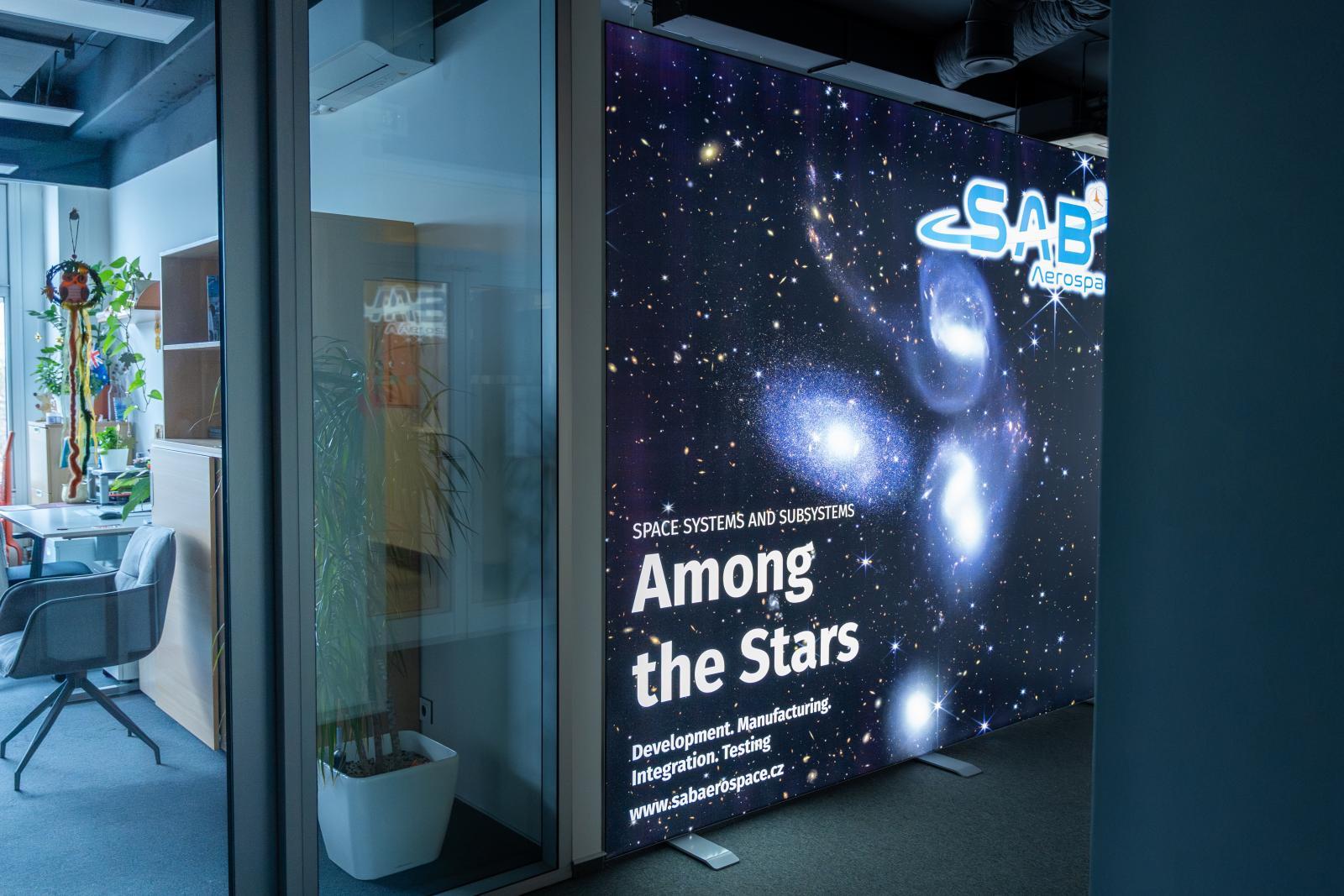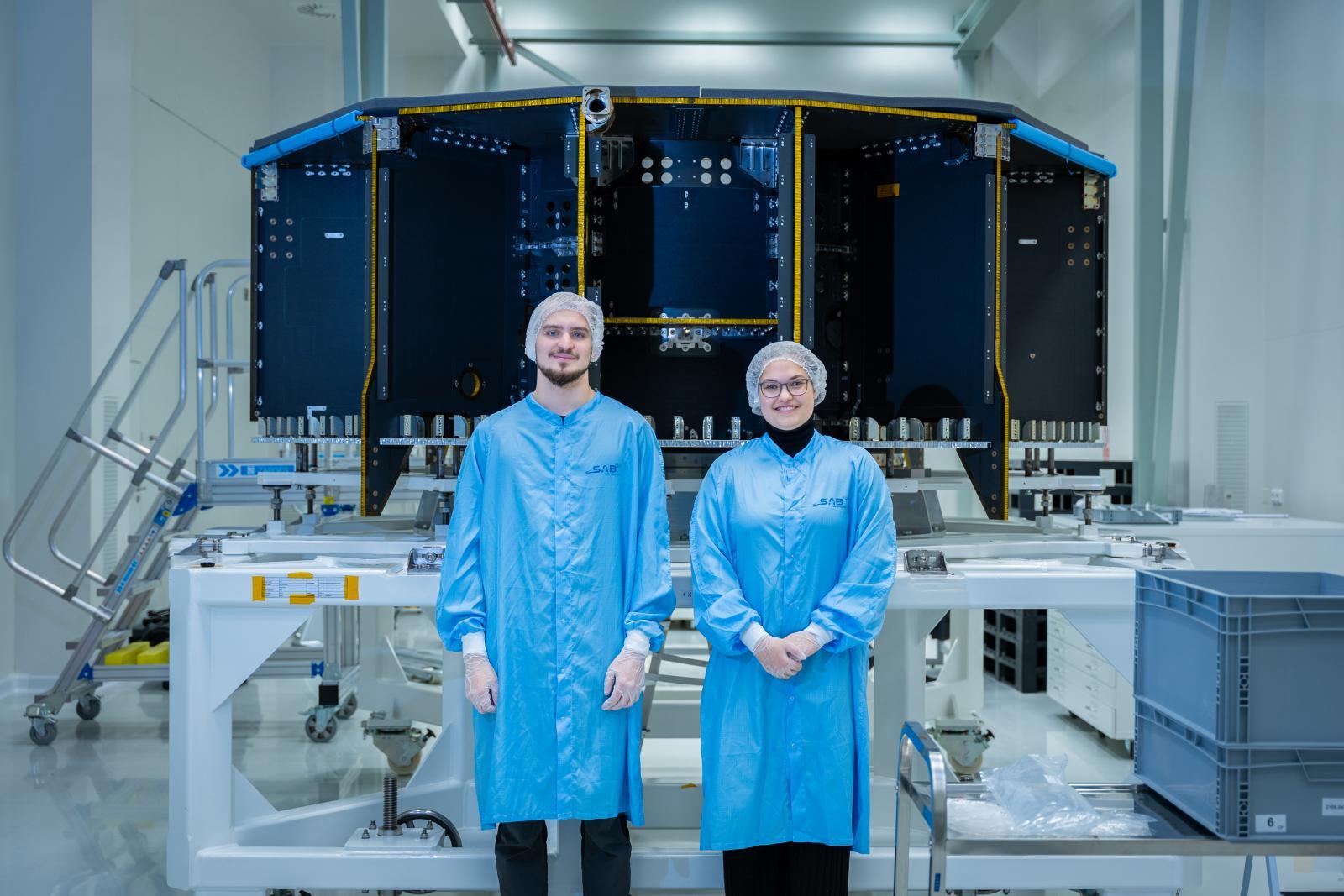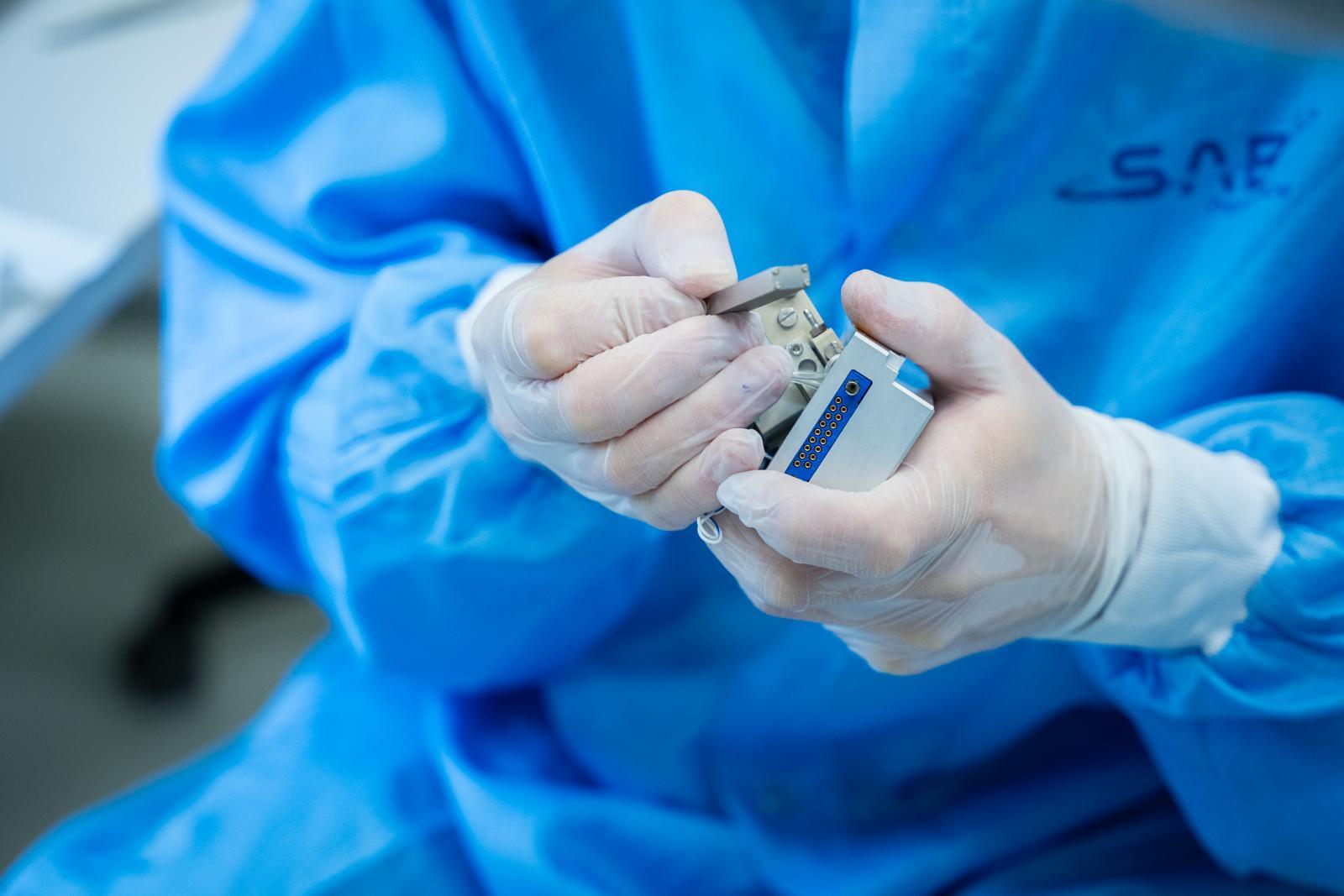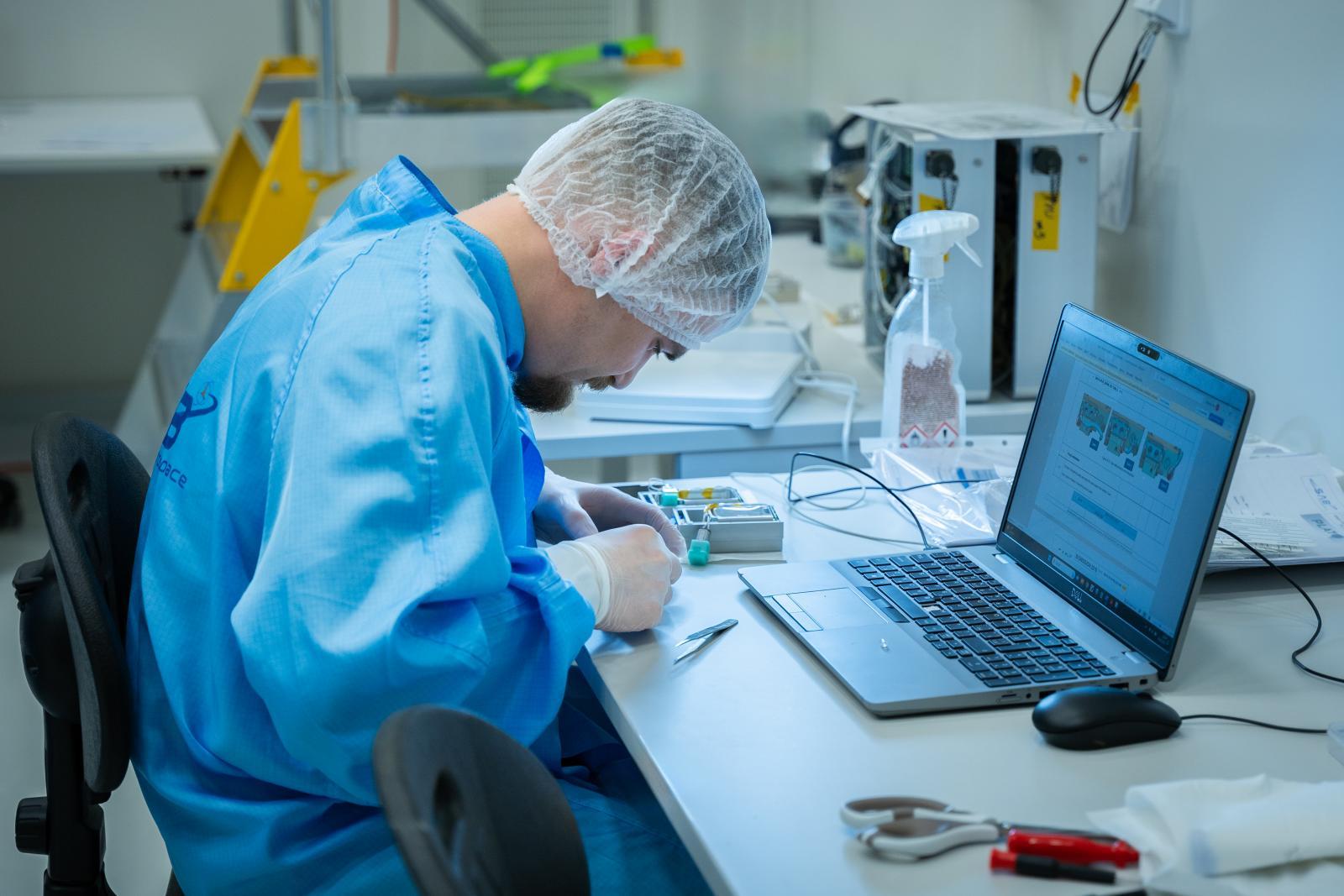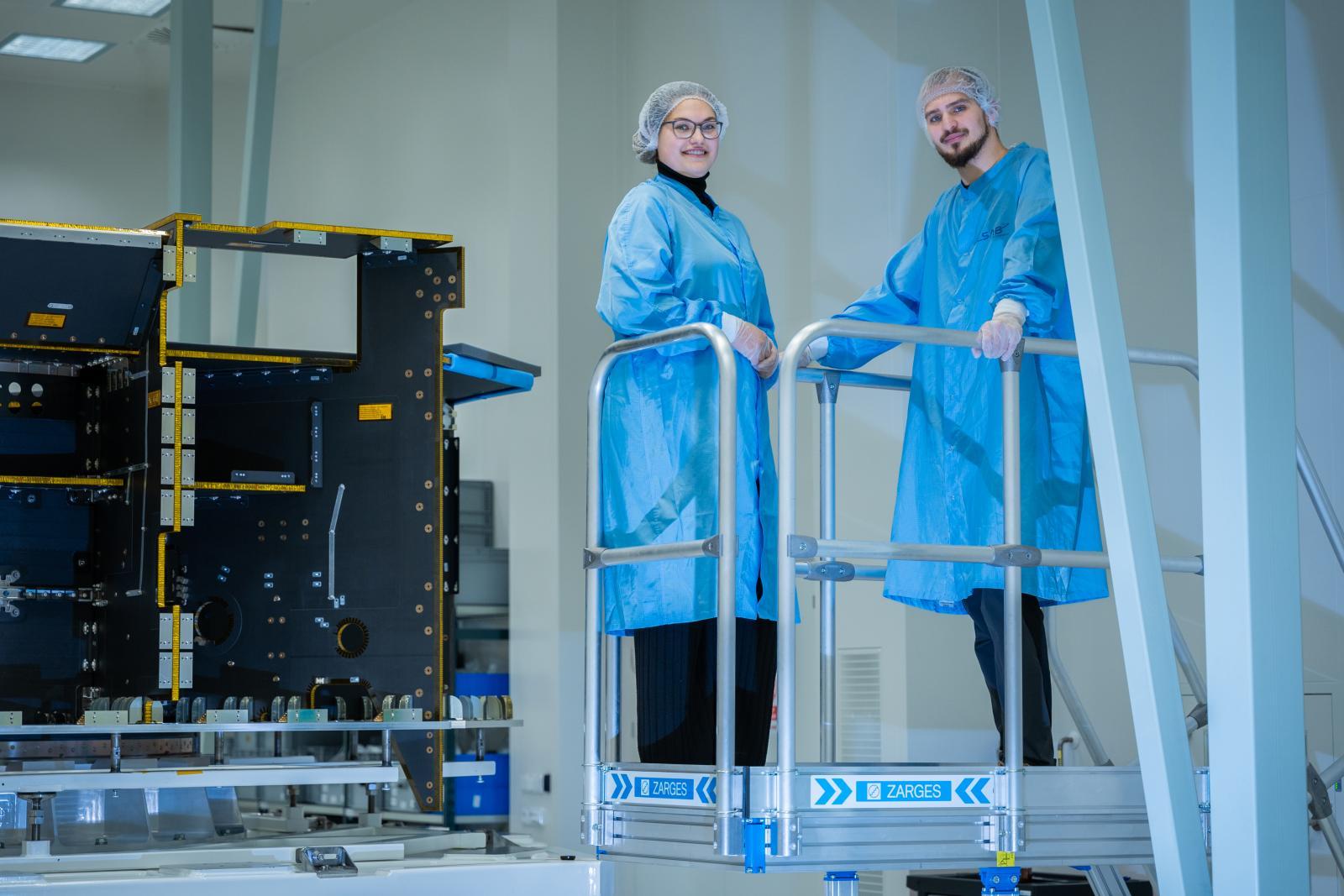Topic
No space for errors. Internship in a space company forces BUT students to change their thinking
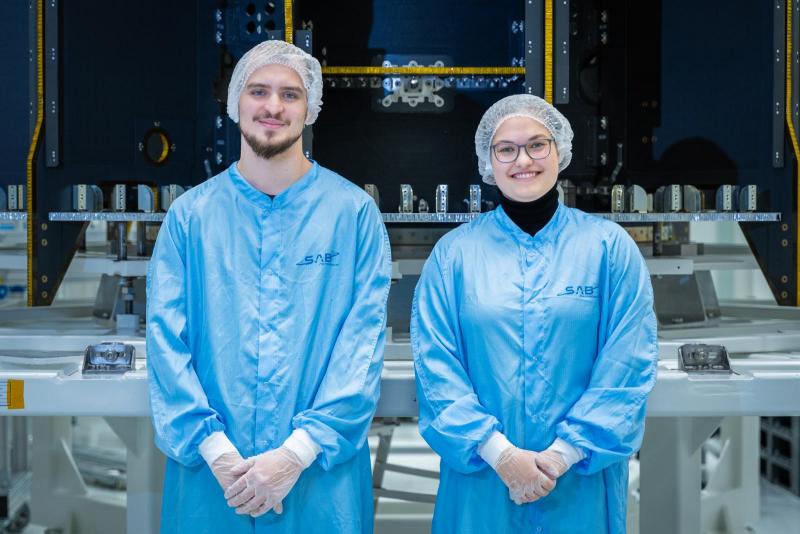
How can you get involved in European space projects while studying at BUT? What does the position of Product Assurance entail and how does the fact that space forgives no mistakes affects performance? We discussed this with Michael Doležel and Barbora Čermáková who are both gaining valuable experience in the leading Czech "space" company S.A.B. Aerospace. What are the advantages of the company being located in the Technology Park Brno right next to the university?
"As far back as I can remember, I always wanted to do things related to space, but I thought I wouldn't get the chance," says Michael, a third-year student at the Faculty of Electrical Engineering and Communication BUT (FEEC). We are sitting in the modern offices of S.A.B. Aerospace in one of the buildings in Technology Park Brno (TPB). He works here as an intern and helps with space projects. "It's much more interesting than working for the automotive industry, for example. I also think it will serve humanity more than car parts," says Michael, who is studying Electronics and Communication Technologies and came to S.A.B. through a friend from the BEST student association who told him about the offer two and a half years ago.
His colleague Bára, a second-year student at the Faculty of Mechanical Engineering BUT (FME), is with us in one of the company's smaller meeting rooms and adds a pragmatic angle to her reasons for working on space projects.
Bára already has experience in changing her field of study. At first she was interested in bioinformatics at Masaryk University, only to realise after a while that the technical side of her studies, such as robotics, attracted her more than biology or chemistry. Therefore, she transferred to FSI, where she is now studying Fundamentals of Mechanical Engineering and found exactly what she was looking for.
No room for errors
For Bára, studying was not enough. That's why she went to the Career Fair organized by FME every year, where she caught the eye of the managers of S.A.B. She soon joined the company for an internship and in less than a year she had already gained a different and more comprehensive view of what she knew about design and related assumptions from school – about drawings, orientation in tolerances or the functionality of materials. "I often think to myself when going through design documents – aha, I already know that! Thanks to the internship, things I had only learned from textbooks fit together. It's great when I can see the real impact of an application."
The internship in the aerospace industry is teaching both interns to think in a different way, not just about design. "We're kind of the police, the link between the project manager and the other people who take care of the sub-parts of the project. We have the right to intervene in any part of the development, through documentation, through the design itself, and also through the inspection of the parts. If any problem arises within the project, it is solved through us," explains Michael.
Even the general public knows the story of the Challenger and Columbia space shuttle disasters, which happened due to seemingly trivial seal failures or loose pieces of the structure. "In the space industry, we cannot wave our hands at inaccuracies that are acceptable in other industries. For example, a leak in a part can have fatal consequences in space, irreversibly ending a project that several teams have been working on for, say, 5 years," confirms Bára of the high demands of the space industry that determine the nature of their work as PAs. In effect, this means that both of them, in following the sequences of the company's production chain from design to final assembly, are primarily tasked with analysing "what could get f*cked up", as Bára comments bluntly.
"We have to have an overview of each component, study its often extensive documentation, and also physically, even under a microscope, inspect and photograph it," Bára explains part of her tasks, as we later inspect a 2-tonne "flight" model of a space satellite in the clean laboratory of the Technology Park Brno. More precisely, its basic construction, which is intended for the PLATO (PLAnetary Transits and Oscillations of Stars) mission. Once the construction is completed in Brno, the foreign partners will equip it with additional systems such as solar panels or engines and, above all, 26 telescopes that will be in orbit for at least 4 years to monitor selected parts of the sky and search for Earth-like planets.
"Everything is designed to withstand the harsh conditions in space and survive the launch vehicle take-off when extremely strong vibrations occur," explains Michael, who is in charge of PLATO as PA. They both try not to admit too much responsibility and try to do things as best as they can. They also rely on communication with other team members and multiple checks in and out of the company, for example at the European Space Agency.
Both BUT students and companies benefit from the nearby Technology Park Brno
Both Bára and Michael praise the conditions they have in S.A.B. Especially during the exam period, it is difficult to balance their duties at BUT with work on company projects. Therefore, they both welcome the fact that the company allows them to work flexible hours or work from home. "Compared to school, the company is something different. Even if I have 300 pages of documentation to check, after a busy day at the faculty it's a release for me," smiles Bára.
Both of them consider it a significant advantage that Technology Park Brno, where S.A.B. Aerospace is located, is right across the street from the school. "It's nice. I can go to the company for an hour or two right after the lectures and utilize the time," confirms Bára again.
Technology Park Brno, which celebrated its 30th anniversary last year, is an example of building infrastructure on the so-called “triple helix axis” – in cooperation with universities, businesses and the government. This particular project brought together the City of Brno, Brno University of Technology and the British construction company BOVIS in the early 1990s. At that time, the company was headed as CEO by Brno native and former student of BUT Frank Lampl, who, thanks to his experience with similar projects in the USA, was the driving force behind the project.
"We consider it very important that BUT decided to join the project soon after its foundation. For local companies, this is one of the key factors, where they perceive the proximity of the university, students and specialized workplaces and laboratories as a significant competitive advantage and in some cases as an absolute must," says Jitka Sládková, Marketing and Strategy Director at TPB, highlighting the importance of the connection between BUT, Technology Park Brno and companies.
"The location of offices and clean rooms necessary for the aerospace industry in the immediate proximity of BUT is advantageous for S.A.B. Aerospace on many levels. As a result, for example, we have a number of BUT graduates among our staff, and we are also seeing a growing interest from its students in internships and involvement. Like many other technical sectors, the 'space' sector is suffering from a lack of staff in the Czech context and there is considerable interest in BUT graduates. In this respect, the new two-year engineering programme Space Applications at FEEC and its graduates will also grow in importance. It is obvious that the inspiring and modern genius loci that Technology Park Brno has been offering for 30 years is largely possible thanks to the connection between the academic and business spheres. On the other hand, this cooperation is not only facilitated by the very existence of the complex, its maintenance and management, but also by the efforts of the TPB management to look for potential for further development," said Tomáš Moravec, CEO of S.A.B. Aerospace and also a graduate of the Faculty of Business änd Management BUT.
Fascination with the cosmic future
Whether it's the mentioned PLATO or other projects such as Biomission, which will transport laboratory experiments between Earth and the International Space Station (ISS), the work involved fascinates both Bára and Michael: "We can be a part of something that people could only dream about 20 or 30 years ago. It's exciting to think about where we'll be in another 20 years, now that we're at this level. It's fascinating to see the whole industry grow," says Bára, explaining her motivation.
Michael nods in agreement and adds: "To a person outside the industry, it seems at first glance that not much is happening in the aerospace sector. Until you start following the specialist platforms. Then you realise that the whole 'space' sector is developing very quickly and that Czech companies are playing a growing role in it."
Michael has another remarkable role to play. At S.A.B., he manages the excursion programme for primary and secondary school pupils and students. He says that in each class there are 5 or 6 children who show a higher level of interest during their visit. "It's great that the excursion gives them an opportunity to think a little more about space and maybe one day go in the same direction as me or Bára."
Optical fibres will help peek into the deepest parts of the brain. A doctoral student from FME is involved in the research
Martin Cígler: The biggest obstacle to faster a development of it is the lack of people
Women from BUT who move the world of science and technology
Command station at FEEC BUT also controls CevroSat-1 satellite, which was sent into space by Elon Musk's SpaceX.
Miroslav Kasal: Experimental radio electronics is my life's credo
